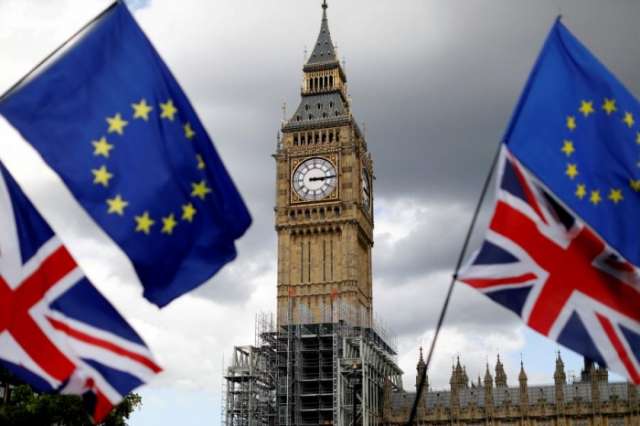A senior EU official told the Guardian that the UK appeared ready to honour its share of the EU’s unpaid bills, loans, pension and other liabilities accrued over 44 years of membership. “We have heard the UK wants to come along with the money,” the official said. “We have understood it covers the liabilities and what we consider the real commitments. But we have to see the fine print.”
The bill could total £53bn to £58bn (€60bn to €65bn), although EU officials are not discussing numbers and the British government will fight hard to bring the total down. While EU sources have spoken in recent months of £53bn to £58bn, both sides are trying to avoid talking numbers to help the British government deal with the potentially toxic political fallout.
Theresa May got the agreement of key cabinet ministers last week to increase the amount that the UK was willing to pay. However, sources made clear that the discussion at the meeting of the Brexit cabinet subcommittee did not include agreeing to a particular figure, but instead to signing up to a method by which the bill could be calculated.
For EU diplomats the moment of truth will come at a lunch meeting between May and the European commission president, Jean-Claude Juncker, on Monday 4 December, when all three Brexit divorce issues will be on the table: the Brexit bill, the Irish border and protecting EU citizens’ rights. If the EU’s chief negotiator, Michel Barnier, thinks the outcome is clear, he could issue his recommendation on sufficient progress the same day.
EU leaders will make the final decision at a European council meeting on 14 and 15 December, but Barnier’s recommendation to move on to the second phase of Brexit talks will be crucial. His decision will trigger an intense round of discussions in 27 EU capitals, involving different government departments and, in some cases, parliaments.
“I think we can reach sufficient progress, but again we haven’t seen anything on paper yet, so I am always extremely cautious,” said the EU official.
The FT has reported the gross liabilities to be more than €100bn, which fall to €55bn to €75bn once the UK’s share of EU assets is taken into account.
The signs of agreement over money have left the Irish border as the most uncertain issue hanging over the talks. EU diplomats are uncertain whether the Irish government could hold up the process by calling on Barnier to refuse sufficient progress. “There are lots of different signals coming about the possibility of an Irish veto,” said one diplomat. “As things stand now, I’d say we have 50/50 chance of that happening.”
A UK government source said that with negotiations still going on there would be no comment yet on specific figures. Those being cited currently seemed “speculative”, the source added.
Sources close to the member states counselled against overoptimism about talks moving on at the meeting of the EU’s leaders on 14 and 15 December.
The problem of how the British intend to avoid a hard border on the island of Ireland remains unsolved, and the republic is insistent on “a road map” to how Downing Street intends to avoid a new border.
The British government has ruled out Northern Ireland in effect staying in the single market and the customs union, as Barnier had encouraged in the talks.
One senior diplomat said: “The divorce bill should be fine now. That was the big issue. And then it wasn’t. The border is the big worry. And I don’t know how they can square that circle. That is the big one now and it is up to the Irish to decide.”
EU diplomats were informed at lunchtime on Tuesday that enough progress on the divorce bill had been made for a meeting to be required on Friday, although the agreement may have been reached by the end of last week.
The final sum is 13% of the £660bn total liabilities the UK has committed to as a member state, including the seven-year budget ending in 2020, pension costs and outstanding loans, such as those to Ukraine, and to cover the costs of keeping Chernobyl safe.
The sum is reduced when payments that would have been made to EU projects in the UK, including structural funds, are taken into account, along with the UK’s capital share in the European Investment Bank.
The divorce bill will not be paid in a lump sum but over time, under the agreement struck in behind-the-scenes talks between Olly Robbins, Downing Street’s Brexit adviser, and the EU’s article 50 task force.
As the UK will continue to pay until all recipients of pensions have died, the final sum is unknown. It has long been expected that the final sum would land at between £40bn and £48bn.
Senior diplomats in Brussels said they were confident that the financial settlement would not now hold up the talks. “I think Germany, who has been strong on this, will be happy enough and the French will follow their lead,” said one source.
It is expected that the commission will propose a joint statement for the member states to scrutinise over the weekend ahead of a series of meetings next week.
British sources suggested that one leading leave campaigner, Michael Gove, is comfortable if that figure creeps up beyond £40bn as he is keen to show his loyalty to May. But Boris Johnson, the foreign secretary, who was seen as a key advocate of the claim that Brexit would recoup £350m a week for the NHS, has been more resistant to the suggestion of paying large amounts. He had suggested EU officials should “go whistle” over calls for €60bn to €100bn. However, he has more recently backed the prime minister’s position.
Other Brexit-supporting MPs have been less forthcoming. Priti Patel, who was recently forced to resign as international development secretary, said this week that she would have told Brussels to “sod off” over its divorce bill demands.
Bernard Jenkin told the Guardian: “It better be worth it!” Others such as Iain Duncan Smith and Jacob Rees-Mogg have urged May to hold tight before offering too much.
Labour MP Chuka Umunna said Johnson and Gove promised there would not be a big divorce bill to pay. “The big new facts emerging are that there will be a big divorce bill to pay and that means the £350m extra per week for the NHS promised by the Leave campaign – without which they say they would have lost the referendum – simply will not happen,” he said.
“This is very significant and not what people voted for, which is why we should have an open mind on what happens at the end of these negotiations.”
The Brexit secretary, David Davis, cancelled an initial plan to be in Brussels on Friday to help the final discussions with the commission along, it is understood.
Sources instead said Davis would now go to Brussels on Monday to join May for a dinner with Juncker. One diplomat said: “Juncker wants his big moment.”
Following the dinner, there will be a meeting of ambassadors to the EU on Wednesday to give their sign-off and a meeting of the EU’s 28 commissioners. A spokesman for the commission declined to comment.
More about: #Brexit















































